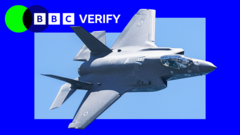The renewed dialogues in Istanbul highlight a potential path forward for Iran's nuclear negotiations and international relations.
**New Dialogue Sparks Hope for Iran's Nuclear Future**

**New Dialogue Sparks Hope for Iran's Nuclear Future**
Iran engages in constructive discussions with European diplomats amidst rising tensions and sanctions threats.
In a pivotal development, Iranian diplomats convened with representatives from the UK, Germany, and France for discussions regarding the country's nuclear program, marking the first engagement following recent Israeli attacks that escalated tensions in the region. The discussions took place within the backdrop of a 12-day conflict that saw the US also involved in strikes on Iranian nuclear sites, casting long shadows over US-Iran diplomatic relations.
Attendees from the European trio, often referred to as the E3, have urged Iran to make significant strides in the negotiation of a new nuclear accord before facing the reinstatement of sanctions by the end of August. During the meeting, Iran's Deputy Foreign Minister Kazem Gharibabadi described the conversations as "serious, frank, and detailed," indicating a commitment to ongoing consultations. He voiced strong opposition to the re-imposition of sanctions, labeling such actions as "completely illegal."
The backdrop to these resolutes lies in the 2015 Iran nuclear deal, which saw the easing of sanctions in exchange for Iran's commitment to limit its nuclear activities and allow for international inspections. The US withdrawal from the agreement in 2018, initiated by President Trump citing inadequate measures to curtail Iran's path to nuclear weaponry, ushered in a new era of intensified sanctions and Iranian non-compliance.
As talks commenced, the director general of the International Atomic Energy Agency (IAEA), Rafael Grossi, suggested that Iran is open to resuming technical-level discussions concerning its nuclear program, emphasizing the need for transparency regarding its nuclear facilities. Concurrently, Iranian officials have urged the E3 to use this meeting as an opportunity to amend their past unproductive strategies and criticized their support of US-Israeli actions as a moral violation.
The ongoing narrative encompasses Iran's suspension of cooperation with the UN nuclear watchdog following heightened tensions, notably after the Israeli strikes on June 13. In an ironic twist, after intense military exchanges, the US provided Iran with a two-week diplomatic window, during which a tentative meeting occurred in Geneva. However, US military operations, dubbed "Operation Midnight Hammer," were soon launched to curtail Iran's nuclear capabilities.
Despite the claims of destruction from US operations, intelligence assessments reveal that Iran's nuclear program remains intact, suggesting that the conflict has merely delayed its advancement. This delicate situation compels all parties involved to tread carefully in their pursuit of diplomatic resolution and stability in the ever-evolving geopolitical landscape of the Middle East.



















